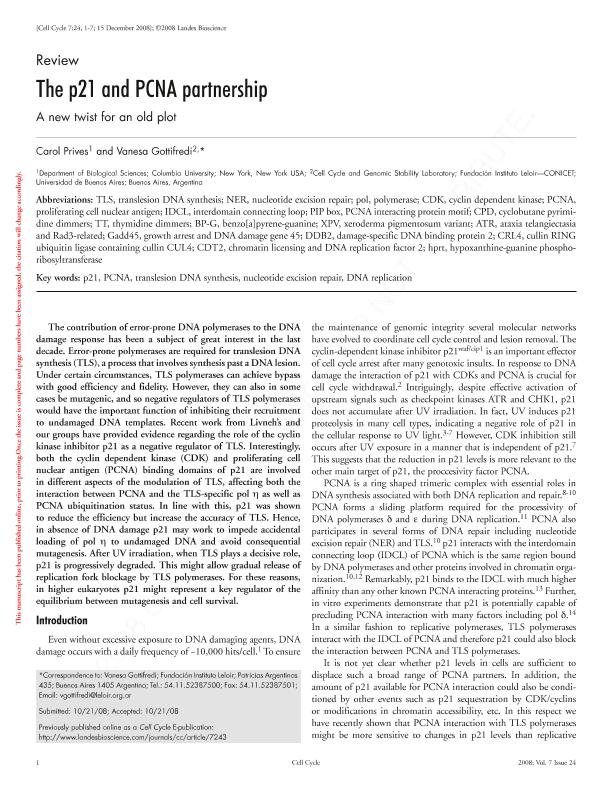Artículo
The p21 and PCNA partnership: a new twist for an old plot
Fecha de publicación:
12/2008
Editorial:
Taylor & Francis
Revista:
Cell Cycle
ISSN:
1538-4101
e-ISSN:
1551-4005
Idioma:
Inglés
Tipo de recurso:
Artículo publicado
Clasificación temática:
Resumen
The contribution of error-prone DNA polymerases to the DNA damage response has been a subject of great interest in the last decade. Error-prone polymerases are required for translesion DNA synthesis (TLS), a process that involves synthesis past a DNA lesion. Under certain circumstances, TLS polymerases can achieve bypass with good efficiency and fidelity. However, they can also in some cases be mutagenic, and so negative regulators of TLS polymerases would have the important function of inhibiting their recruitment to undamaged DNA templates. Recent work from Livneh's and our groups have provided evidence regarding the role of the cyclin kinase inhibitor p21 as a negative regulator of TLS. Interestingly, both the cyclin dependent kinase (CDK) and proliferating cell nuclear antigen (PCNA) binding domains of p21 are involved in different aspects of the modulation of TLS, affecting both the interaction between PCNA and the TLS-specific pol eta as well as PCNA ubiquitination status. In line with this, p21 was shown to reduce the efficiency but increase the accuracy of TLS. Hence, in absence of DNA damage p21 may work to impede accidental loading of pol eta to undamaged DNA and avoid consequential mutagenesis. After UV irradiation, when TLS plays a decisive role, p21 is progressively degraded. This might allow gradual release of replication fork blockage by TLS polymerases. For these reasons, in higher eukaryotes p21 might represent a key regulator of the equilibrium between mutagenesis and cell survival.
Palabras clave:
P21
,
Pcna
,
Translesion Dna Synthesis
,
Dna Repair
Archivos asociados
Licencia
Identificadores
Colecciones
Articulos(IIBBA)
Articulos de INST.DE INVEST.BIOQUIMICAS DE BS.AS(I)
Articulos de INST.DE INVEST.BIOQUIMICAS DE BS.AS(I)
Citación
Prives, Carol; Gottifredi, Vanesa; The p21 and PCNA partnership: a new twist for an old plot; Taylor & Francis; Cell Cycle; 7; 24; 12-2008; 3840-3846
Compartir
Altmétricas




